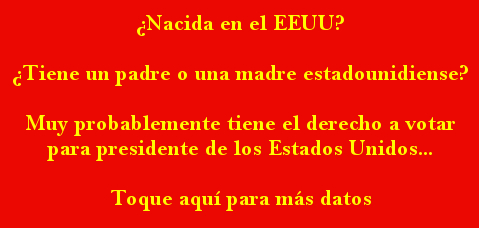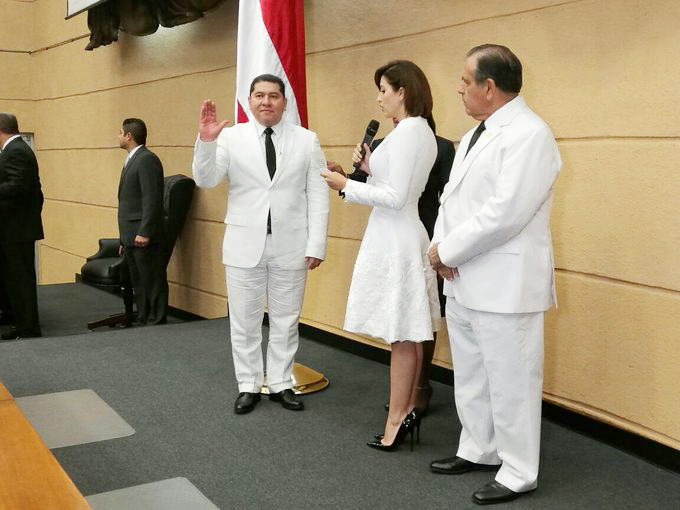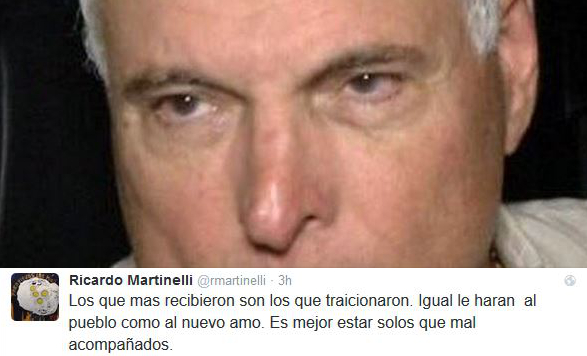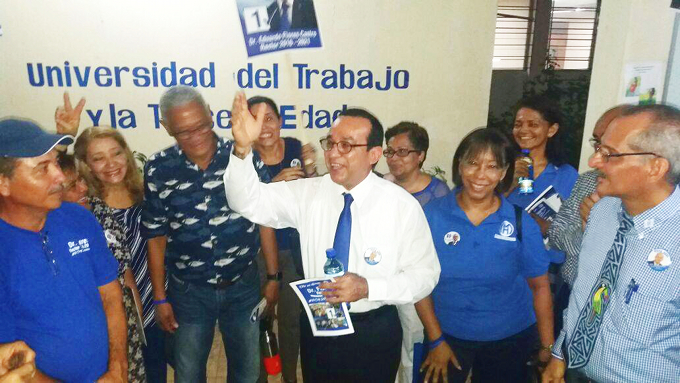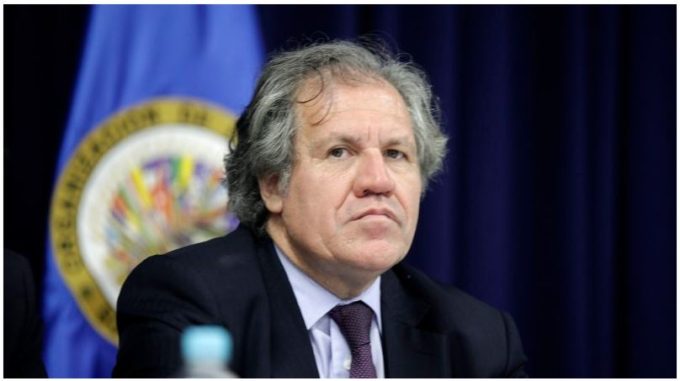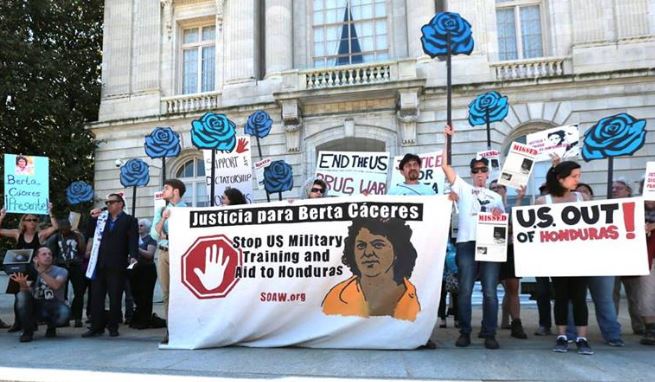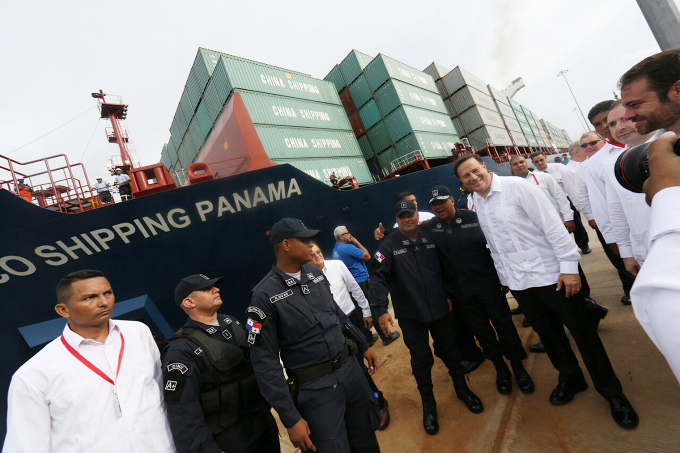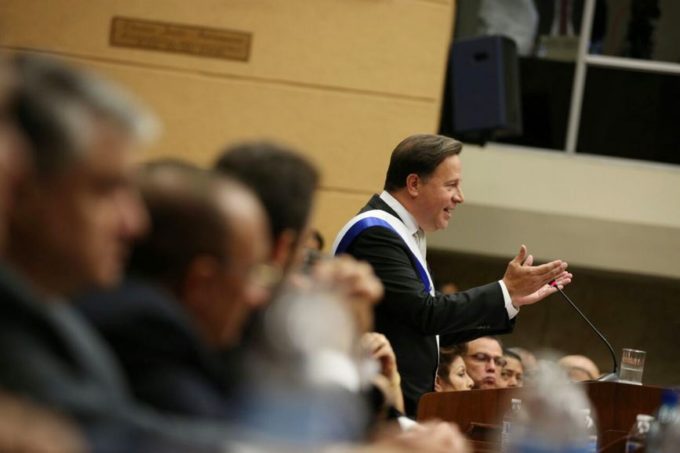
Informe a la nación
por Juan Carlos Varela
Hace dos años fui instalado por esta Asamblea como Presidente de la República en el mismo estadio donde todos los panameños unidos soñamos, reímos, celebramos nuestras victorias y lloramos nuestras derrotas. El tiempo ha pasado rápido pero se los digo hoy: Panamá ha cambiado y seguirá cambiando para el bien de todos.
De la misma forma que hace 27 años pasamos de una dictadura a una democracia, durante los últimos dos años hemos pasado de una democracia a una democracia funcional donde el poder se usa exclusivamente para servir y no para hacer negocios.
La diferencia es que quienes fueron parte de la dictadura terminaron aceptando la democracia y le enseñaron a sus hijos a vivir en ella, pero ahora algunos que fueron parte de la democracia al servicio de los negocios, la política partidista y el clientelismo, se niegan a aceptar el mandato que recibimos del pueblo panameño para consolidar una democracia funcional, en la que los fondos públicos tienen que administrarse con transparencia para beneficio de todos los ciudadanos, donde el Gobierno respeta la separación de poderes, los derechos humanos y el Estado de Derecho, pero sobretodo, donde nadie está por encima de la ley y los servidores públicos tenemos la obligación de rendir cuentas.
Los invito a que acepten esta nueva etapa porque de la misma forma que Panamá no regresará jamás a la dictadura, los panameños no permitiremos más nunca que el poder político se use de manera arbitraria para hacer fortunas.
Todos los gobiernos construyen obras. Este va a construir muchas y con transparencia incluso terminará todas las que heredamos con sus dificultades. La construcción de todos los hospitales y del Centro de Convenciones se ha reactivado. Hemos iniciado obras por ocho mil millones de dólares y reactivado proyectos por más de mil millones en las 10 provincias y comarcas del país.
Pero nuestra principal obra será devolverle al pueblo una democracia funcional donde los recursos del Estado y del Canal interoceánico que le pertenecen a todos los panameños se administran con eficiencia y equidad para desarrollar las obras que hacen falta para mejorar la calidad de vida del pueblo panameño.
Que orgullo sentí este domingo cuando fui a Colón y vi las esclusas de Agua Clara de nuestro nuevo Canal Ampliado, pero créanme que igual orgullo sentí cuando luego del evento, le pude enseñar al Administrador del Canal, Jorge Quijano, las siete mil nuevas viviendas que estamos construyendo para los dueños del Canal, el pueblo de Colón, que a pesar de vivir a escasos kilómetros de la vía interoceánica, cohabitan en casas condenadas y muchas familias se ven obligadas a compartir un sólo servicio higiénico. Eso lo estamos cambiando juntos.
Nuestros planes de Gobierno están avanzando y estamos desarrollando grandes obras y proyectos en nuestro país. La Línea 2 del metro progresa a buen ritmo. Con el Gobierno de Japón cerramos un financiamiento de 2,600 millones de dólares para la construcción de la Línea 3 y la contratación de la gerencia de este monumental Proyecto, el cual pronto iniciará junto con las obras del Cuarto Puente sobre el Canal.
La empresa MIBUS ya le pertenece al Estado y es operada por una de las empresas con más experiencia en el mundo para dar paso a una integración efectiva del Sistema de Buses con las Líneas del Metro de Panamá. Ahora, que contamos con un nuevo operador, la flota de buses se está renovando, los conductores se están capacitando y las frecuencias están aumentando. Estamos dando pasos importantes en la dirección correcta y el aumento del número de usuarios del sistema de transporte público nos indica que estamos recuperando la confianza de la población.
La construcción de la nueva terminal del Aeropuerto de Tocumen progresa bien y nuestra posición como Centro Logístico de las Américas crece. Más de 500 kilómetros de carreteras nuevas están en construcción y 400 kilómetros en proceso de licitación.
El mes pasado, se inició la construcción de la primera planta de generación de energía a base de gas natural licuado en toda Centroamérica.
Esta planta de energía es un catalizador hacia el futuro en materia de energía y nos brindará la posibilidad de convertir a Panamá en el centro de distribución de Gas Natural Licuado para toda la región.
Miles de estudiantes iniciaron el año escolar en aulas y escuelas nuevas y renovadas gracias al programa “Mi Escuela primero”. La Beca Universal se aumentó y ahora se paga a tiempo.
Reconozco que seguir renovando las escuelas y capacitando a nuestros docentes sigue siendo un gran reto y somos conscientes que aún falta mucho por hacer.
La economía continúa creciendo, los precios de canasta básica se encuentran estables, la producción de alimentos está aumentando y los índices de delincuencia están bajando. La renovación de la Ciudad de Colón avanza, ¡Colón volverá a ser una vez más la joya del Caribe que siempre debió ser!
Pero lo que más me alegra, son los proyectos que no necesariamente vemos todos los días, pero que están cambiando profundamente la vida de miles de familias panameñas a lo largo y ancho de todo el país.
Yo no he venido aquí a contar mi historia sino a compartirles como a través de los Programas de nuestro Plan de Gobierno estamos impactando la vida de la población y con la ayuda de Dios, la siembra que estamos haciendo hoy, la van a cosechar miles de panameños.
Techos de Esperanza, Barrios Seguros y el Programa 100% Agua Potable y Sanidad Básica, están transformando nuestro país en formas que algunos no comprenden, pero les aseguro,
que tienen un impacto y un significado humano de valor incalculable para el futuro de la nación panameña.
En este momento, quiero compartir con ustedes la historia de la familia de Ovidio Mendoza y su hija Zuleika, a quienes les dotamos de acceso al agua potable y le construimos un baño higiénico en su casa.
Los Mendoza son una de las 70 mil familias que ya están siendo beneficiadas de nuestra meta de impactar 300 mil hogares a través del Programa “100-CERO”, mejorándoles su salud y calidad de vida.
A la familia de Manuel González, también le impactamos su calidad vida y ahora es una de las 30 mil familias que ya están siendo beneficiadas y ahora cuentan con una vivienda digna y segura, con servicios básicos para su esposa y sus tres hijos gracias al programa “Techos de Esperanza”. Antes su casa era de Zinc y piso de tierra.
Como parte de este Programa, continuaremos trabajando muy duro para beneficiar a 100 mil familias durante nuestro mandato de Gobierno.
Emanuel Anderson y Yahira Pinto son de Colón. Ellos viven en un cuarto con sus cinco hijos y comparten un solo baño para todo el edificio.
Los Anderson son una de las miles de familias que serán beneficiadas con la Renovación Urbana de Colón. Ahora se mudarán a un apartamento de tres recámaras con un baño, donde todos podrán vivir y crecer en familia.
Issac Castillo ya había perdido cinco amigos cuando aceptó cambiar su vida.
Issac quería ver a sus hijos crecer y ahora trabaja en la Empresa Ford. Él es uno de los más de 2,500 jóvenes en riesgo social que ya han sido incorporados al programa “Barrios Seguros” para prevenir y combatir la delincuencia creando más oportunidades.
La joven Diana Chavez, es cuadro de honor de la escuela Cristóbal Adán Urriola, la cual fue totalmente renovada y la docente Yaritzel Aviles, una de los más de 2500 profesores de escuelas públicas que han tenido la oportunidad de viajar a los Estados Unidos, Canadá y Reino Unido, para ser capacitados en el Inglés como segundo idioma.
Gracias a los programas “Mi Escuela Primero” y “Panamá Bilingüe”, la joven Diana y la profesora Yaritzel, serán parte de una nueva generación de más de 500 mil estudiantes y más de 10 mil docentes capacitados en el idioma Inglés, que contarán con nuevas aulas de clases, laboratorios e instalaciones deportivas y recreativas, adecuadas y suficientemente equipadas para impartir y recibir una enseñanza de calidad “100% bilingüe”.
Todos estos programas están siendo manejados con transparencia pero lo más importante para mí, es que a los Mendoza, los González, los Anderson, Issac, Yaritzel y los padres de Diana, nunca se les preguntó a qué partido pertenecen, ya que todos los programas de nuestra Administración han sido concebidos con visión de Estado, criterio social, y sin distinciones político-partidistas o de ninguna otra índole.
Como resultados de los diálogos iniciados con los gremios y la clase política del país, se están dando cambios importantes para fortalecer nuestros sistemas de salud educación y gobiernos locales.
Elevar los acuerdos resultantes de estos diálogos a nivel constitucional es clave para garantizar que los mismos no sólo sean logros de un gobierno sino de todo el país.
Por lo tanto, durante el próximo año trabajaremos una hoja de ruta de forma y de fondo para hacer las reformas necesarias a nuestra Constitución Nacional.
En el marco del actual período de sesiones de la Asamblea, introduciremos iniciativas legislativas importantes para fortalecer la institucionalidad del país, incluyendo el Proyecto de Ley de Carrera Penitenciaria y el Proyecto de Ley que crea el Centro Nacional de Medicamentos, que facilitará las compras conjuntas de medicamentos e insumos médicos, por parte de la Caja del Seguro Social y el MINSA, lo que nos permitirá ahorrar dinero y reinvertirlo en el sistema de salud pública.
Con la ampliación del Canal culminada, tal y como lo había prometido, iniciaremos un diálogo, en el marco de la Concertación Nacional para el Desarrollo, a fin de encontrar alternativas que nos permitan hacerle frente al déficit del Programa de Invalidez, Vejez y Muerte de la Caja del Seguro Social.
En materia de política exterior, mantendremos una posición firme ante los países que insistan en incluir a Panamá en listas que afectan la imagen de nuestro país.
Reconozco, que corregir las irregularidades del pasado, ha tomado más tiempo de lo esperado, pero hoy Panamá es testigo de grandes proyectos que se llevan a cabo de manera honesta y transparente, con más proyectos en camino para este año.
Algunos podrán cuestionarme por esto pero les aseguro, nunca me disculparé por haber tomado el tiempo necesario para defender los intereses del Pueblo y continuaré asegurándome que los impuestos del arduo trabajo de nuestros hombres y mujeres en todo el país, sean invertidos por el gobierno en obras que mejoren su calidad de vida.
A mis ministros, ustedes son gente honesta seria y capaz: Comuniquen mejor los logros de nuestra gestión y redoblen esfuerzos para avanzar en la ejecución de las obras de gobierno. Tenemos que continuar fortaleciendo la institucionalidad del país pero agilizar el paso para cumplir con el pueblo panameño.
A la Corte y los funcionarios del Órgano Judicial: No permitan que jueces empañen la imagen del sistema de administración de justicia dejando en libertad a peligrosos criminales que amenazan la imagen del país e inclusive amenazan nuestras propias vidas.
A los miembros de esta Asamblea Nacional: Bajo mi Administración hemos demostrado que los respetamos a todos y estamos dispuestos a trabajar con los 71 Diputados, con criterio social y visión de Estado por el bien de sus comunidades.
A las autoridades locales, representantes y alcaldes: Ya hemos puesto a su disposición más de 180 millones a través de la descentralización. Ahora con estos fondos les toca acompañar al Gobierno Central para resolver los problemas de sus comunidades con transparencia.
La clase política debe evitar el contacto con personas que puedan andar en pasos equivocados. Tengo que compartir con ustedes mi preocupación, porque durante los últimos meses hemos visto a miembros de la clase política y personas allegadas a estos en situaciones muy delicadas.
De la misma forma que los panameños nos logramos reconciliar durante la transición de la dictadura a la democracia, donde se cometieron graves violaciones de los derechos humanos, podemos reconciliarnos para consolidar una democracia funcional. Pero para que haya reconciliación también tiene que haber el arrepentimiento y el reconocimiento de las faltas cometidas. Vamos a cerrar ese capítulo oscuro de nuestra historia y avanzar unidos como un solo país.
Cuando asisto al mismo estadio donde fui juramentado como Presidente a ver a nuestra selección, apenas empieza el partido, en las gradas comenzamos a opinar sobre cambios de jugadores y de estrategia.
Así somos nosotros los panameños, así actuamos en los deportes y en nuestra vida diaria y
eso se respeta.
La mayoría de ustedes me escogieron como su capitán. Para los que me escogieron y para los que no, yo soy el capitán de esta selección.
Me toca dirigir un equipo de más de 200 mil funcionarios públicos para servir a 4 millones de panameños y estoy en el campo todos los días trabajando muy duro por ustedes.
Desde donde estoy, escucho sus aplausos y sus críticas, pero estoy totalmente enfocado en ganar el partido, cumpliendo con todos los compromisos que hice en campaña.
Mi gobierno va a ser muy parecido a mi campaña política y mi vida pública llena de luchas y sacrificios. Yo no heredé capital político, lo gané recorriendo los barrios y comunidades de mi hermoso país, al cual no le voy a fallar.
Entiendo que nadie celebra las derrotas, sólo se celebran las victorias, pero en el campo, no se celebran las batallas, sólo se lucha para ganar.
Eso es lo que estamos haciendo y se los digo hoy: al final, vamos a ganar el partido, y ese día vamos a celebrar todos juntos, porque nuestra victoria no será mía o de mi gobierno, será de Panamá.
Les aseguro, que las líneas 2 y 3 del Metro serán construidas y el Proyecto de Renovación Colón será culminado con su puerto libre;
Les aseguro, que las 100 mil casas de Techos de Esperanza y las 300 mil soluciones de sanidad básica de 100-CERO serán entregadas;
Y les aseguro, que las más de tres mil escuelas del país serán renovadas y nuestros sistemas de educación, salud y transporte público serán de primer mundo. Ese es mi compromiso y lo estamos cumpliendo.
Entiendo y comparto las frustraciones de los ciudadanos respecto al sistema de administración de justicia.
Confío en que la entrada en vigencia del sistema penal acusatorio en el mes de septiembre representará una oportunidad para cualquier ciudadano o servidor público, que habiendo actuado al margen de la ley, acepte sus faltas y asuma su responsabilidad.
Sus familias y el país se lo agradecerán.
He venido a fortalecer y respetar las instituciones pero pueden tener la certeza que usaré el poder que me atribuye la Constitución y la Ley para que las cosas funcionen y se haga justicia.
Estamos en un punto crucial en la historia de nuestro país y nos enfrentamos a un gran reto como gobierno y como ciudadanos.
¿Qué tipo de país queremos? ¿El país que se movía sin planificación ni transparencia, donde los políticos y allegados al poder abusaban de la autoridad y el Tesoro Nacional se utilizaba como caja registradora para retirar fondos a discreción en beneficio propio? Como era antes.
O una democracia funcional, con un gobierno honesto que implementa proyectos con transparencia, visión de Estado y criterio social para transformar la vida de su gente de manera trascendental y fortalecer nuestra democracia. Un gobierno que no les pone etiquetas políticas a sus ciudadanos.
No fue fácil poner la casa en orden pero lo hemos logrado, las finanzas del Estado están sólidas y hemos sentado las bases para mantener nuestro crecimiento económico y garantizar un desarrollo sostenible y planificado.
Nada, ni nadie me van a impedir que ponga los intereses de Panamá primero y les aseguro que continuaré luchando con cada gota de energía que tenga para asegurarme que los próximos Presidentes de la República que acudan a rendir cuentas ante esta Asamblea, vengan a representar y defender los intereses de la nación panameña por encima de todo.
Desde lo más profundo del pulmón de nuestros niños y jóvenes ya soplan aires de cambio y renovación que traerán a nuestro país una nueva época de prosperidad con transparencia y equidad para todos los panameños.
Nadie nos va a detener. Les invito a que sigamos trabajando juntos para hacer realidad el sueño panameño. Que Dios Bendiga a Panamá y a su noble pueblo.
Muchas gracias.
~ ~ ~
Estos anuncios son interactivos. Toque en ellos para seguir a las páginas de web



